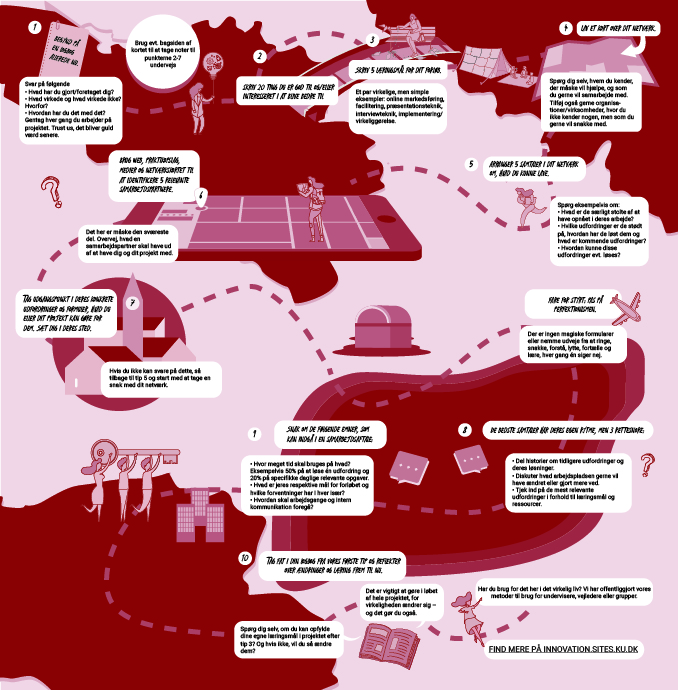Background
Academic internships, or practical training, have become more common and important in higher education programmes. However, these internships are associated with various challenges, because they are relatively complex collaborations with multiple stakeholders and agendas. It is a challenge to align different interests and agendas in order to ensure a successful process for all involved parties, which consist of three primary stakeholders: 1) The student, 2) an external partner or company and 3) the higher education institution.
A pilot project was launched at South Campus at the University of Copenhagen, where three method-based workshops were developed on the basis of the effectuation model. These workshops were intended to enhance students academic internships and guide them in a more innovative and entrepreneurial direction.
The methods were developed on the basis of a new book ‘Entreprenør: Proces – Projekt’ (Entrepreneurship: Process – Project) by the then associate professor at the Department of Information Studies Michael Kristiansson.
The process
In the project, mainly Faculty of Humanities students from widely different programmes and levels participated in a series of workshops where each workshop was based on an effectuation-inspired method: Bird-in-Hand, Patchwork/Network and Effectual Cycle. The process is to prepare students; qualify them to manage the project and get them to consider and apply innovative methods in their projects. Overall, the process focuses on four aspects: 1) The students’ current and desired competences, 2) communication and interaction between the parties, 3) forming groups, teams and networks and 4) reflection and learning during the process.
The process introduces some methods to how students can take the initiative and assume responsibility in regard to establishing a relation to an external partner and create a basis for a good project, where the area of expertise is not only applied in practice but also to seek to create change or innovation. In this way, the academic internship can give students their first experiences with an entrepreneurial mindset.
It is important to emphasise that the aim of the preparatory process was not necessarily to get students to start their own business. The aim was to lift the academic skills and put them into play with an external partner by developing entrepreneurial competences and to ensure that students’ were able to clarify their capabilities and motivation regarding an upcoming academic internship.
It is also important to emphasise that it was not a project goal to find a specific partner for students for the subsequent academic internship. That task is up to the individual student because it is an important part of the learning process, however, it is possible that the students will meet a future partner within the framework of the networks they engage with during the process.
Results
20 students from widely different programmes and countries embarked on this process. It was a group characterised by diversity. Approximately half of the group completed the process, although it took some individual adjustment in the end due to time pressure and exams, and the majority of those who completed were also part of the subsequent academic internship. During the students’ academic internships in the following semester, Michael Kristiansson did qualitative interviews with three students. In these interviews, the students highlighted that they had been given tools for project management, handling unexpected events, co-creation and preparing projects in general. In addition, they had become more aware of the possibilities to collaborate with smaller companies and other organisations rather than well-known public institutions, and they had been challenged in their view of their own core competences and their pre-perception of the academic internship.
As a follow-up on the process, we have produced a pocket guide that serves as a supporting guideline for the process. Behind the course, the pocket guide and the three methods lies a theoretical basis, which is described in the introduction to each of the three methods. The method instructions are written is a manner that does not require extensive specialist or theoretical knowledge. We hope that this text, the method descriptions and the pocket guide will help organisers to facilitate a similar process on their own. It is, of course, possible to supplement with other material and develop the process to fit other circumstances.
The pocket guide can be used by students to prepare for individual internships. It can also be used in relation to group activities, for example interdisciplinary student groups. Furthermore, it can be used by teachers who want to implement the course as part of their teaching and supervision. If you want a printable version, please see innovation.sc.ku.dk.
Facts
Course: Use your academic skills in academic internships (co-curricular workshops)
Course Coordinators: Michael Kristiansson and Jonas Grøn
Participants: 20 students from the University of Copenhagen
Duration: February to June 2018
Guests: Three-four experienced researchers/lecturers, 10 entrepreneurs and a pitch coach.
The project was funded by the Danish Foundation for Entrepreneurship.

